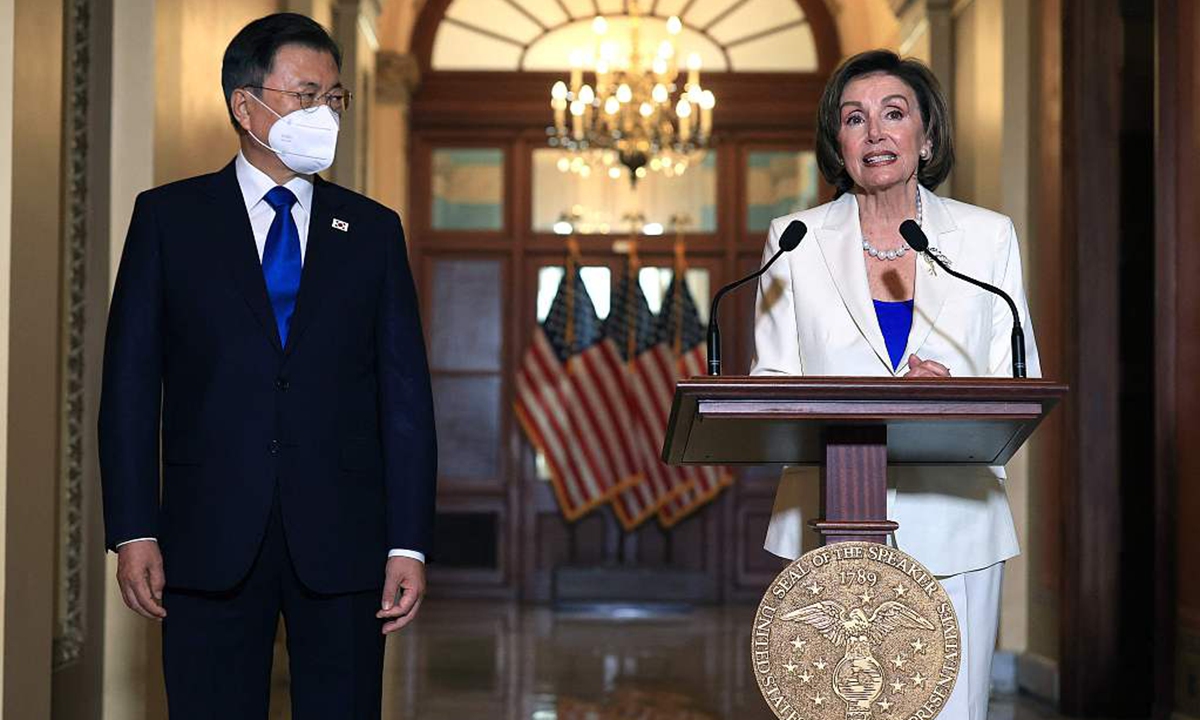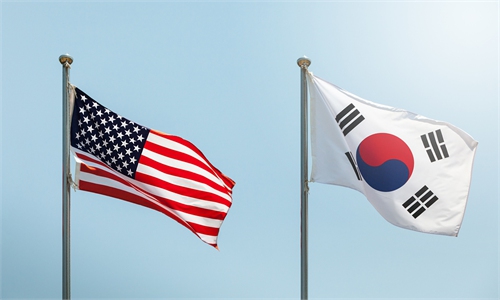Hyping Taiwan question is US’ ‘wishful thinking’ in statement with South Korea: expert

South Korean President Moon Jae-in (L) listens as Speaker of the House Nancy Pelosi speaks during a press conference after a meeting on Capitol Hill on May 20, 2021 in Washington, DC., the United States. Photo: VCG
Chinese experts on Friday refuted the hype by US officials and media outlets, which claimed the island of Taiwan could be outlined in a joint statement after a Friday meeting between US President Joe Biden and South Korean President Moon Jae-in, and their tone may be no less as strong than the US-Japan joint statement in April.
Moon, the second foreign leader to meet Biden in the White House following Japanese Prime Minister Yoshihide Suga, met with leaders of the House of Representatives on Thursday, discussing vaccine cooperation, semiconductor supply and the Korean Peninsula nuclear issue.
South Korea's Yonhap News Agency reported on Friday that Moon stressed that the development of US-China relations is also important to South Korea, and Seoul will help maintain the stability of US-China ties on the basis of the South Korea-US alliance.
An anonymous White House official said the US, Japan and South Korea face the same challenges, which include China, Voice of America reported. The Financial Times also reported the Biden administration is pushing Moon to take a tougher line on China.
Suga and Biden in April underscored the importance of "peace and stability in the Taiwan Straits," playing up the "China threat" theory. Citing the official, VOA said the South Korea-US joint statement will stress "China [Chinese mainland]'s move to the island of Taiwan" and will not be softer than the US-Japan statement.
The US under the Biden administration has been busy forging a united front in the Indo-Pacific to curb China's growing influence. Before clashing with Chinese senior diplomats in Alaska, US Secretary of State Antony Blinken and National Security Advisor Jake Sullivan visited South Korea and Japan, a move that closely followed the QUAD security dialogue with India, Australia and Japan.
Experts reached by the Global Times stated that it is obvious the US is rallying its allies against China, but most of the countries know that the Taiwan question is China's red line. South Korea, a strategic partner of China, is unlikely to move strongly against China in its joint statement with the US, especially when it comes to Taiwan.
Unlike Japan, which is leaning toward the US, South Korea still wants to take no sides and maintain an independent diplomatic stance, Lü Chao, a research fellow at the Liaoning Academy of Social Sciences, told the Global Times on Friday.
"This is always the rational and pragmatic strategic choice for Seoul, and there is no reason for Moon to yield to the US over Taiwan," said the expert, noting that the hype surrounding Taiwan is more of the US' own "wishful thinking."
Zheng Jiyong, director of the Center for Korean Studies at Fudan University in Shanghai, told the Global Times that while the joint statement is unlikely to include tough statements against China over the Taiwan question, another possibility cannot be ruled out: secret military cooperation, such as involving South Korea in logistical support and intelligence sharing involving the Taiwan Straits and the South China Sea.
In 2017, with rallies and banners, South Korean people expressed their fury and discontent toward the US' overreaching move that harmed peace, after the Moon administration decided to deploy US anti-missile system THAAD against North Korea and even China. South Korean companies also faced resistance from Chinese consumers.
Zheng said that the role of South Korea in cooperating with the US in playing the "Taiwan card" is limited. If the two countries push too far on the issue, it would have a significant impact on the solution of the Korean Peninsula issue which cannot be solved without China's participation.
Experts see the US-South Korea dialogue as more of an exchange of interests within the existing framework, especially when Biden has taken an interest in Korean Peninsula issue, after dealing with the Middle East, Iran and Afghanistan.
Rather than directly telling the US that it does not take sides, South Korea may want to get what it needs in exchange, by limited "closeness" to the US, Zheng said, noting that Moon hopes to get support from the Biden administration on the Korean Peninsula issue.
South Korea also hopes to use semiconductor cooperation to solve the country's difficulties, such as vaccine supply, experts said.
South Korea may feel that US dominance in the semiconductors industry is still unshakeable, so it expects that its cooperation and compromises with the US in areas like investment and even partial participation in restrictions against China could be understood by China, said Zheng.
Facing pressure from Washington, South Korea regards the military alliance with the US as its important diplomatic foundation.
"It is possible for South Korea to make concessions to the US on China-related issues other than the Taiwan question … Pro-American forces in South Korea will also put pressure on the Moon administration," Lü said.


